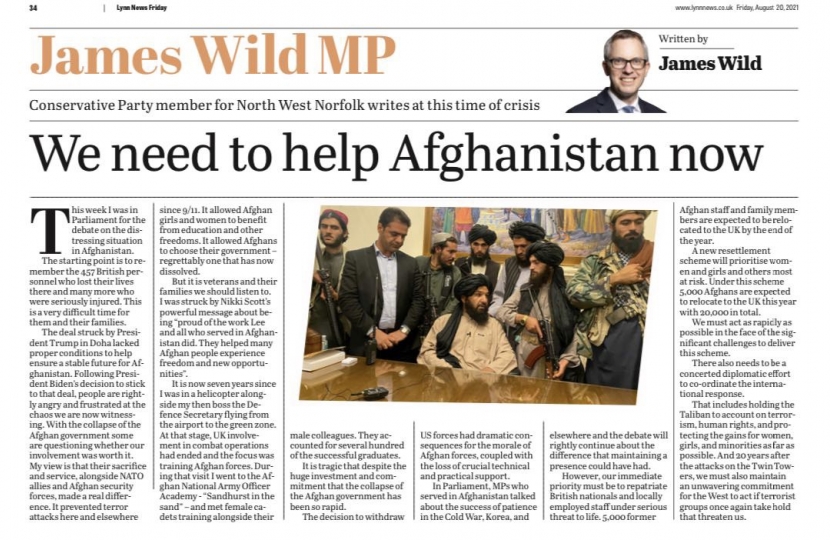
Drawing on his experience as an adviser to the Defence Secretary from 2014-17 when UK Armed Forces were focused on training Afghan Security Forces, James has written about the crisis in Afghanistan in his weekly column in the Lynn News:
"This week I was in Parliament for the debate on the distressing situation in Afghanistan. The starting point is to remember the 457 British personnel who lost their lives there and many more who were seriously injured. This is a very difficult time for them and their families.
The deal struck by President Trump in Doha lacked proper conditions to help ensure a stable future for Afghanistan. Following President Biden’s decision to stick to that deal, people are rightly angry and frustrated at the chaos we are now witnessing. With the collapse of the Afghan government some are questioning whether our involvement was worth it. My view is that their sacrifice and service, alongside NATO allies and Afghan security forces, made a real difference. It prevented terror attacks here and elsewhere since 9/11. It allowed Afghan girls and women to benefit from education and other freedoms. It allowed Afghans to choose their government – regrettably one that has now dissolved.
But it is veterans and their families we should listen to. I was struck by Nikki Scott’s powerful message about being “proud of the work Lee and all who served in Afghanistan did. They helped many Afghan people experience freedom and new opportunities.”
It is now seven years since I was in a helicopter alongside my then boss the Defence Secretary flying from the airport to the green zone. At that stage, UK involvement in combat operations had ended and the focus was training Afghan forces. During that visit I went to the Afghan National Army Officer Academy - “Sandhurst in the sand” – and met female cadets training alongside their male colleagues. They accounted for several hundred of the successful graduates.
It is tragic that despite the huge investment and commitment that the collapse of the Afghan government has been so rapid. The decision to withdraw US forces had dramatic consequences for the morale of Afghan forces, coupled with the loss of crucial technical and practical support. In Parliament, MPs who served in Afghanistan talked about the success of patience in the Cold War, Korea, and elsewhere and the debate will rightly continue about the difference that maintaining a presence could have had.
However, our immediate priority must be to repatriate British nationals and locally employed staff under serious threat to life. 5,000 former Afghan staff and family members are expected to be relocated to the UK by the end of the year. A new resettlement scheme will prioritise women and girls and others most at risk. Under this scheme 5,000 Afghans are expected to relocate to the UK this year with 20,000 in total. We must act as rapidly as possible in the face of the significant challenges to deliver this scheme.
There also needs to be a concerted diplomatic effort to co-ordinate the international response. That includes holding the Taliban to account on terrorism, human rights, and protecting the gains for women, girls, and minorities as far as possible. And 20 years after the attacks on the Twin Towers, we must also maintain an unwavering commitment for the West to act if terrorist groups once again take hold that threaten us."

